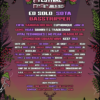Daughter are back with an album for unsettling, confusing times. Stereo Mind Game dances uneasily between themes of intimacy and separation, working through the unanticipated consequences of love in a collection of songs that may be their most personal yet.
Not counting the video game soundtrack Music From Before The Storm, it’s been seven years since Daughter’s last studio album, Not To Disappear. Going into Stereo Mind Game, the first impression is that the band has been frozen in amber since then, with instrumental opener ‘Intro’ being a re-entry point to the dark dream world that Daughter creates so well. It’s comforting to hear its gentle lull, even nostalgic if If You Leave was the soundtrack to your formative years. For the first couple of listens, Stereo Mind Game is like meeting a close friend you haven’t seen since high school. You are immediately drawn to the things you remember and liked, but spending time together gradually reveals a more profound and sad truth. You are not the same as you were, and neither are they. Daughter revel in those moments of realisation, drinking the emotions in deep, stretching time and distorting our sense of what is real and true in the process.
The time the band has spent apart working on their own projects, including Elena Tonra‘s 2018 solo album as Ex:Re, appears to have refined that approach further. No longer based in London with Remi Aguilella relocating to Portland, Oregon, and Igor Haefeli now living in Bristol the album was written and recorded in Bristol, London, San Diego, California and Vancouver, Washington. While Daughter don’t make too many changes to their sound, everything else about this album feels strangely less certain, less assured and yet more optimistic in its ambitions. The cynicism of Not To Disappear has all but evaporated, along with the misanthropic malaise which put all human emotions on trial. Instead, there are recurring themes of having to let go, or of being separated from the people and places you love, of losing oneself, and the longing to reconnect to something pure. There are also a couple of huge ‘stadium sing-along’ moments on Stereo Mind Game, songs that reach out to the humanity we have in common.
That longing for another is felt implicitly in Tonra’s new vocal warmth and explicitly through her poetic sense-making of impossible situations. While writing the album in California, she made a deep personal connection with someone. Back home in London and separated from this person by the Atlantic, Tonra reflects on the need for acceptance and hope, rather than dwelling on negative emotions. Across the album, there are lyrical glimpses into these memories, and the video that accompanies the single ‘Be On Your Way’ gives further clues. Nature plays an important part, with the “blue and pink ceiling” of beautiful midsummer skies representing a shared moment of intimacy. Both real and figurative expanses of water also feature on ‘Swim Back’ a hazy, rolling, shoegaze track with lush strings provided by the 12 Ensemble (who also worked with Tonra on her solo project). She imagines planning a future life with a distant lover, a task as easy to achieve as parting the ocean: “I just need to erase distance”. It’s referenced again on the starkly beautiful ‘Isolation’: “Oh, it will likely kill me/That I must live without you/Because I can’t swim”.
‘Future Lover’ lurches between hope and disappointment, constantly reaching for the glowing blue light of the phone hoping for messages and “sweet nothings from the ghost in the room”. The insistent beat of ‘Dandelion’ echoes this sentiment, “I’d like to look you in the eyes/Not 3am staring into void waiting for replies”. ‘Neptune’, with its hymnal chorus, is the album’s poetic centre of gravity. Among a congregation of memories and regrets, Tonra’s lone declarations of love are joined gradually by Haefeli’s vocals and then the 12 Ensemble in a heartfelt chorus. On ‘Missed Calls’ other voices reach in from the real world, including those of Tonra’s niece and nephew and other friends, piercing the album’s dreamlike reality, glitching and stuttering as they fall into its flow, hinting at other possibilities: “I had a dream you had a child…”
Elsewhere, Daughter’s attention is turned inward. ‘Party’ is a stand-out moment and a distinctly more direct track exploring the moment Tonra decided to give up alcohol: “The worst night of my life/Or even worse, the best”. This time, the sense of separation is internal, losing oneself in a wash of memories and flashbacks and seeing your friends become more distant as your inner voice becomes increasingly self-destructive. Loss of control and helplessness is examined again on ‘To Rage’, picking over the embers of a heated moment among slowly unfolding, spiralling guitars.
Stereo Mind Game returns to its romantic interest on the closing song ‘Wish I Could Cross The Sea’. Tonra’s final lines “Nocturnal little animals/You keep each other up” are playfully abstract, perhaps a reference to the desires and dreams that wake us up in the dead of night. Messages from another universe reminding us we are not living our best lives. “Is there time enough?” Tonra asks. Never, while we’re busy wishing it away.
‘Stereo Mind Game’ is released on 7th April via 4AD
Photo: Marika Kochiashvili




